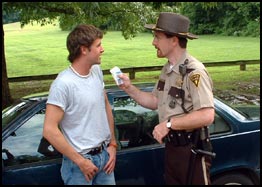Newsbrief:
Traffic
Stop
Not
a
License
for
Criminal
Investigation,
Illinois
Supreme
Court
Says
11/28/03
In a pair of decisions handed down November 20, Illinois' highest court has held that police conducting traffic stops may not undertake criminal investigations of drivers or passengers without a reasonable suspicion that a crime has been committed. The twin decisions broaden Illinois citizens' right to be free from unlawful search and seizure and provide greater protection than granted by the US Supreme Court in similar cases. In one case, the court threw out the conviction of a man arrested after a drug dog sniffed his car during a traffic stop. In the other, the same line-up of judges threw out the conviction of a passenger who was arrested after providing identification to a police officer, who then used it to run a warrant check. Roy Caballes was stopped for driving 71 mph in a 65 mph zone on Interstate 80, and while one trooper wrote him a speeding ticket, another trooper arrived with a drug-sniffing dog and walked around Caballes' vehicle. When the dog alerted, troopers searched the vehicle, found marijuana in the trunk, and arrested Caballes. Caballes filed a motion to suppress the evidence, arguing that the search was illegal because there was no reasonable suspicion that he was in fact committing a crime. In trial court testimony, prosecutors produced no tell-tale smells, roaches in ashtrays, or any other evidence other than that Caballes appeared nervous and was wearing a new suit. The motion was rejected and Caballes was convicted. He appealed, and last week the Illinois Supreme Court agreed that the drug dog search resulting in Caballes' arrest was not allowed.
The same logic prevailed in the case of Raymond Harris, a passenger in a car stopped for an illegal left turn. When the sheriff's deputy involved discovered the vehicle's driver had no valid driver's license, he asked Harris to produce his. Harris did so, and the deputy then checked his identity for outstanding warrants. Harris had one, was arrested on the old warrant, and upon being searched subsequent to arrest was found to be in possession of crack cocaine. He was convicted, but appealed, arguing that police had no probable cause to run a warrant check on him. Again, the Illinois Supreme Court agreed. "The warrant check was not supported by a reasonable, articulate suspicion that Harris had committed or was about to commit a crime," Justice Charles Freeman wrote, overturning Harris' conviction. While Illinois Attorney General Lisa Madigan is threatening to take the rulings to the US Supreme Court, one legal observer told the Illinois State Journal that the decisions were "pretty unreviewable" because federal law allows the states to grant more due process rights than required under federal law. And that's a good thing, said Andrea Lyon, president of the Illinois Association of Criminal Defense Lawyers and a professor at DePaul University College of Law. "I have to say I'm pleasantly surprised because, over the last few decades, we have been giving up so much of the Fourth Amendment," Lyons said. "What the Illinois Supreme Court is doing is saying, 'We take our citizens' right to be free from unlawful searches and seizures seriously.'" To read the decision in People
v. Caballes, visit:
To read the decision in People
v. Harris, visit:
|

